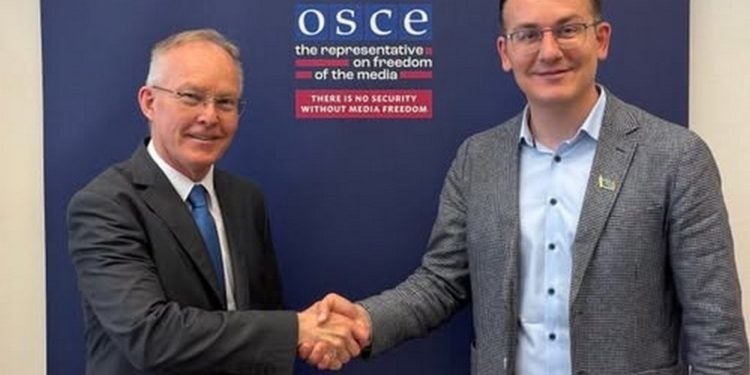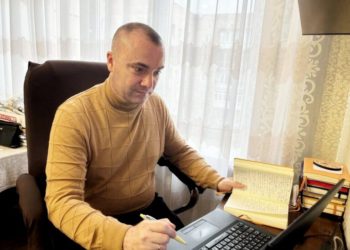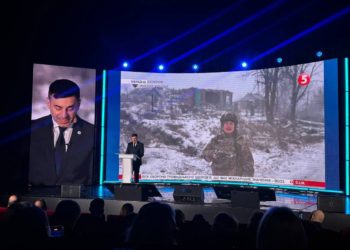The President of the National Union of Journalists of Ukraine (NUJU), Sergiy Tomilenko, held a key meeting with the Organization for Security and Co-operation in Europe (OSCE) Representative on Freedom of the Media, Jan Bratu, in Vienna.
“It was a long, caring conversation with an experienced Norwegian diplomat who is extremely focused on the security of Ukrainian journalists in times of war,” said Sergiy Tomilenko.
Key topics of our conversation:
The release of captive journalists – according to the the NUJU, at least 31 Ukrainian journalists are in russian captivity. Mr. Bratu shares the position on the unconditional release of all prisoners; however, there is currently no direct, effective exchange mechanism.
A special challenge is journalists captured by the russian federation in the newly occupied territories after 2022. Unlike Crimea, where relatives at least know about places of detention (they can organize legal assistance or the transfer of medicines), here there are only facts of detention or disappearance. As a journalist from Zaporizhzhia, Iryna Levchenko, a member of the NUJU, was detained by the occupiers in Melitopol in May 2023…
The Network of the NUJU‘s Journalists’ Solidarity Centers (JSC) – Sergiy Tomilenko presented NUJU‘s critically important “hotline” for journalists: six centers located in cities of Ukraine that provide safe coworking spaces with autonomous power supply, protective equipment (body armor, helmets, IFAK first aid kits), technical support, legal assistance, evacuation, and psychological support. This network has become a real lifeline for media workers – since February 2022, it has provided support to thousands of journalists.
Front-line newspapers – the head of the NUJU presented the OSCE Representative’s Office with copies of Zoria from Lyman, Novyi Den from Kherson, and Visti Prydniproviya from Dnipro. For thousands of Ukrainians without electricity and the Internet, this is the only source of information. He also presented copies of our English-language prototype newspaper, Front–line Press, which tells the world about the phenomenon of the Ukrainian front-line local press. He drew attention to the NUJU documentary video, ‘Pages of Hope,’ about the front-line newspaper from Orikhiv, which was presented the other day at the Congress of the European Federation of Journalists.
“I handed over to the Representative our human rights materials “Executed Free Speech,” reports on war crimes by the russian federation against Ukrainian journalists, testimonies of wounded colleagues, and exposure of trials of journalists in the occupied Crimea,” said Sergiy Tomilenko. “Mr. Jan Bratu is outraged: both in front-line Ukrainian cities and at protests in many countries, journalists are forced to hide the PRESS marking because it becomes a target for attacks. When I was in Orikhiv a few months ago, we deliberately removed the PRESS stickers to avoid targeted attacks by russian drones.”
Critically important: despite hopes for peace talks, Putin is intensifying attacks on Ukraine, and the Union continues to receive urgent requests from journalists. The JSCs network itself needs urgent support after the agreement with UNESCO expires in March 2025.
“Mr. Jan Bratu has only recently started his mandate, but I feel his professionalism and commitment to protecting journalists,” added Sergiy Tomilenko. “He is spoken of as a great friend of media safety by colleagues from the Norwegian Union of Journalists, from Balkan journalist associations, and Ricardo Gutiérrez, Secretary General of the European Federation of Journalists (EFJ), who recommended me a month ago in Brussels during UNESCO events.”
During the EFJ Congress in Budapest, where the Representative spoke in solidarity with Hungarian journalists.
NUJU Information Service

 THE NATIONAL UNION OF
JOURNALISTS OF UKRAINE
THE NATIONAL UNION OF
JOURNALISTS OF UKRAINE
















Discussion about this post